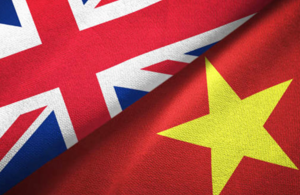Extra funding to help low income countries as refugees join NHS
- Celebration event for refugees training to become frontline NHS staff
- Over 110 refugees moving into nursing and healthcare assistant roles
- £5 million of new funding to support healthcare staff in Africa during pandemic
Refugees and people forced to flee their homes overseas are being supported into NHS roles as millions of pounds of new funding is helping low-income countries train healthcare staff, Health Minister Edward Argar has announced.
Speaking at the Nurse Support Programme Celebration and Learning Event in Liverpool, Minister Argar said that by the end of 2021/22, over 110 refugees and displaced people from the UK and abroad will have been supported into NHS roles including healthcare assistants or fully qualified nurses.
The programme’s work supports UK-based refugees with health and care experience and those with similar skills in overseas refugee camps into appropriate NHS roles, following a course to assess their skill level. The Department of Health and Social Care (DHSC) recently supported displaced people from Lebanon and Jordan to complete the course, with today’s celebration event including many of the students, trainers and recruiting Trusts involved.
Separately, the UK is giving £5 million of funding to the global shortage of quality health workers and increase access to vital services for the poorest and most vulnerable around the world, including refugee populations.
Working with the World Health Organisation (WHO), Tropical Health and Education Trust (THET) and the Christian Health Association of Ghana (CHAG), the new support will develop the future international health workforce in Ghana, Uganda and Somaliland – low-income developing countries with high levels of youth unemployment.
Speaking at the celebratory event, Health Minister, Edward Argar said:
It may be called the National Health Service, but its workforce is truly international, with over 200 nationalities represented within its numbers.
This programme is a fantastic example of innovation and cross-system working. It started with a novel idea – to support displaced people with valuable skills and experience into NHS roles. But that idea only reached fruition because of impressive collaboration and teamwork.
While we are absolutely delighted that the candidates today have chosen to work in the NHS, we know that the world is struggling to train, employ and retain a sufficient and skilled health workforce.
I am, therefore, delighted to announce that my Department is spending £5m on the Building the Future International Workforce Programme. The Programme aims to address the shortage of quality health workers and increase access to vital services for the poorest and most vulnerable including refugee populations.
The £5 million will improve the quality and quantity of the health workforce in these countries by training more nurses, including refugees or displaced people, supporting health workforce planning to improve local recruitment and retention, and building the capacity of training institutions through NHS partnerships.
THET Chief Executive, Ben Simms said:
THET is thrilled to be partnering with the Department of Health and Social Care on this vital Future International Workforce Programme. Shortages of health workers globally are acute and set to grow, just at a time when we need them most, and with 1 in 7 of our NHS staff recruited internationally the UK has both a moral and practical stake in this. This programme sets us on a path to contribute to this challenge in ways that will benefit patients in the UK and some of the poorest countries of the world.
UK Director at Talent Beyond Boundaries, Marina Brizar said:
People move; but what makes these people special is that they are refugees moving to start their careers in the NHS and a new life in England through Displaced Talent Mobility. We are thrilled that these remarkable, talented nurses were given the opportunity to leverage their skills to secure their futures. We welcome them to the UK.
WHO Representative to Ghana, Dr Francis Chisaka Kasolo said:
The funding and partnership between WHO and the UK Department of Health and Social Care, will contribute directly to ensuring that more people benefit from universal health coverage without financial hardship, more people better protected from health emergencies, and more people enjoy better health and well-being in Ghana.
Background
- The ethical code of practice for international recruitment can be found here and the UK is not actively recruiting from any of these red list countries.
- The World Health Organisation (WHO) is a leading Government partner in the provision of health services and support in Ghana with a track record of supporting the development and implementation of health policy, including workforce monitoring, incentivisation and management.
- The Tropical Health and Education Trust (THET) is a global health organisation that works to strengthen the health workforce and the health system within which it works. It operates through a model of Health Partnerships between health institutions from the UK and low- and middle-income countries, working together to co-develop responses to locally identified health system priorities.
- The Christian Health Association of Ghana (CHAG) has a mission to provide health care to the most vulnerable and underprivileged population in all 16 Regions of Ghana, particularly in the most remote areas. It has systematic reach to the poorest and most under-served communities where it operates 183 hospitals and clinics including in the communities supporting refugees and displaced people.

